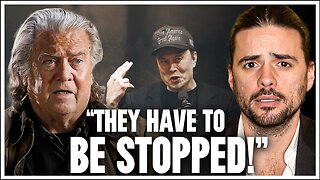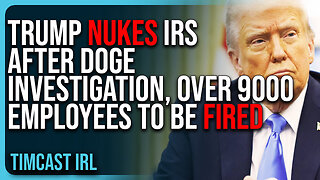Premium Only Content

America First: Understanding Republican Stances on Immigrations and Trade Policies
# America First: Unpacking Contemporary American Ideals in Republican Discourse
In the United States political arena, nuanced interpretations of pressing national issues abound. Growing issues on immigration and trade policies have emerged as significant frontiers that policymakers must navigate, chiefly due to their extensive implications on domestic security and prosperity.
With its well-rooted origins, the America First policy movement is gaining remarkable momentum within Republican circles. As the label suggests, proponents emphasize a more inward-looking approach, favoring national interests above external affiliations or commitments - a call to revitalize the love of home soil and prioritize American citizens' needs.
**Heavyweight Issues: Immigration and Trade Policies**
Whereas *immigration* proved instrumental in steering previously successful campaigns such as President Trump's 2016 election, its significance has not waned. The persistent border security challenges arouse considerable anxiety, spurred by concerns over national security, cultural preservation, and economic balance. Behind the cries for stricter immigration policies, there is an earnest plea for a stable and secure nation, reflecting a quintessential spirit of love for one's country.
The contentious issue of trade policies, particularly regarding relations with China and their implications for technology and wealth transfer, is equally salient. The monumental volume of wealth transferred through Chinese hacking warrants due attention. This palpable tension underscores America's pursuit for fair and reciprocal trade relations, reaffirming an inward-looking economic orientation.
**Populist or Conservative? Drawing the Battle Lines**
Indeed, the Republican party's ideological landscape is no monolith. Diverse policy perspectives characterize what might be broadly labeled as either populist or conservative. Populism thrives on charismatic leaders who represent the people's interests directly, often promising a radical shake-up of the status quo. In contrast, conservatism tends to preserve established traditions, structures, and values, advocating for a slower, more cautious approach to change.
Nonetheless, these dichotomous terms can become muddled when applied to real-world policies, candidates, and their supporters. Both populism and conservatism overlap in some key areas, hence smart observers should refrain from oversimplifying these relationships using rigid definitions. The "America First" agenda, for instance, can be seen as a blend of both ideological strands, favoring national interests and calling for strong leadership.
In essence, the Republican nominee for president will likely be the candidate who can credibly and forcefully convey strength with authenticity, willing to fight for the country and its people. A candidate who embodies the "America First" mantra — whether through populist charisma or conservative resolve — will resonate with a broad spectrum of Republicans.
In times like these, the *America First* policy movement serves as a potent reminder of the need for solutions grounded in domestic priorities. Amid global complexities, the longing for elements of common sense, for basic American values, and for policies that benefit home ground echo the timeless appeal of the America First ideology, continually shaping contemporary Republican discourse.
-
 12:24
12:24
Winston Marshall
1 day agoWOAH! Bannon just Revealed THIS About MUSK - The Tech-Right vs MAGA Right Civil War Ramps Up
127K238 -
 7:33:46
7:33:46
Phyxicx
12 hours agoRaid & Rant with the FF14 Guild on Rumble! Halo Night just wrapped up! - Go Follow all these great guys please! - 2/15/2025
82.3K1 -
 10:42:19
10:42:19
Reolock
14 hours agoWoW Classic Hardcore (LVL 60) | RAID DAY | Rumble FIRST HC Raid
57K4 -
 3:10:03
3:10:03
Barry Cunningham
12 hours agoTRUMP WEEKEND BRIEFING! MORE WINNING...MORE LEFTIES LOSING IT!
45.5K33 -
 2:20:09
2:20:09
Tundra Tactical
11 hours ago $2.14 earnedIs Trumps Executive Order A Second Amendment Wishlist???: The Worlds Okayest Gun Live Stream
28.1K1 -
 2:33:51
2:33:51
John Crump Live
16 hours ago $19.75 earnedSaturday Night Main Event!
88.8K8 -
 13:57
13:57
TimcastIRL
22 hours agoTrump NUKES IRS After DOGE Investigation, OVER 9000 Employees To Be FIRED
109K167 -
 13:35
13:35
Russell Brand
15 hours agoPFIZER JUST MADE THEIR NEXT MOVE AND EXPERTS ARE TERRIFIED
131K241 -
 1:15:57
1:15:57
Victor Davis Hanson Show
1 day agoOver Here, Over There: the Russo-Japanese War and Trumpian Peace Policy
61.9K35 -
 23:55
23:55
MYLUNCHBREAK CHANNEL PAGE
1 day agoThe Nephilim Are Here
90.2K82